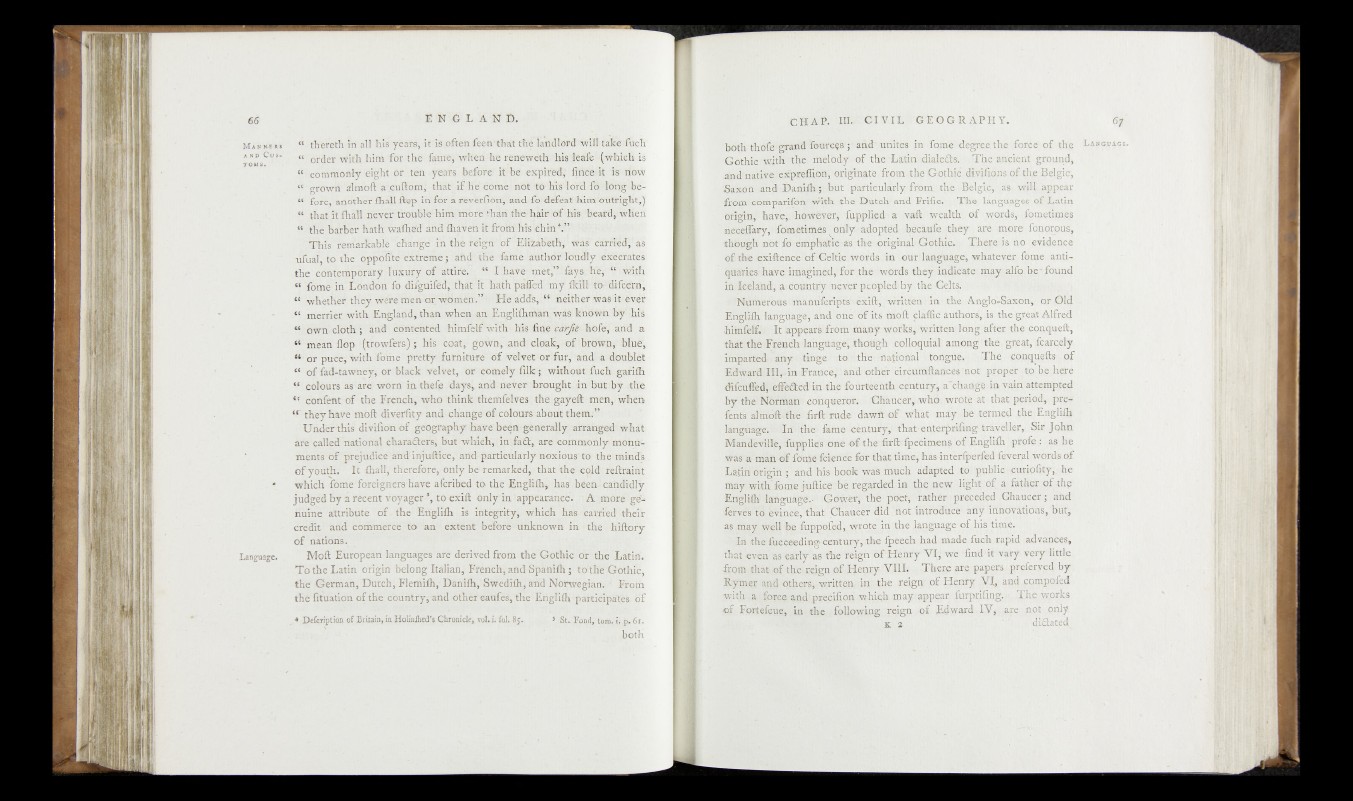
Mankers
amd C ustoms.
Language.
“ thereth in all his yeara, it is .often feen'that the landlord will take fuch
“ order with him for, the fame, when- he rcncwcth his leafe' (which is
« commonly eight or ten . years before it be expired,’ fince-it is' now
<9 grown almoft a cuftom; that if he come not to his lord fo long be-
“ fore, another fhall ftep in for a rèverfiön-, and fo defeat him outright,)
“ that it fhall never trouble him more than the hair of his heard, when
“ the barber hath wafhe'd and fhaven it from his chin V ’ ’’
This remarkable change in the rÈijgiY'öf Elizabeth, was carried, as
ufual,to the oppofite extreme; and: thé fame author loudly execrates
the contemporary luxury of attire. | I have met,” fays he, “ with
« fome in London fo difguifed, that it hath paffed" my' ,fM§ to- difcern,
“ whether they were men or women.” He adds, “ neither was it ever
« merrier with England, than when an J&r^llthf^T^was kht0wn'4^4|hLS
« own. cldtffffSnd1 edntented, öffinfèhrwifh hull a
* 'jnean1 flefpdftiowfers)’; his Ypaftjr göwm, ,and^’dl^fe^^thr>§v(fi<; blue,
**- or puCe^ hcifh lome ^ # tty .tfuf,è i ö ^ ,y:Sf
“ of fad-tawney* or’ black fyêlvët, hd ’eb'maly;flllö'i;.f- wkh(OT®;ijUeffi.,gafith
“ colours as are' worn in thefp dtfysf and- tfevefn hEOfUght' in %ut|by ,*tliè
tc confent of the French, who think themfelves the gayeft men, when
‘ r they have mod: divérfity and change of colours about them.” *,
Under this divifion of geography have been generally arranged what
are called national characters, hut which, in fa£t, arc commonly inonn-
ments óf: prejudice and injuftice, and particularly noxious to the minds
of youth. It fhall, therëfÓrëy only he'remarked, that the cold refttaint
which fome foreigners'have aferibed to- the Englifh, has been candidly
judged by a recent voyageH, to ex ill only in appearance. A moré “genuine
attribute of the Englifh is integrity, which has carried their
crédit and commerce to 'an extent before unknown in the h'iflbry
of nations^
Moft European languages are derived from the Gothic or the Latin,
To the Latin origin belong Italian,- French,;and Spanilh; to the Gothic,
the German, Dutch, Flemilh, Danifh, Swedifh, and Norwegian. From
the fituation of the countryb and other eaufes, the Englifh participates of
* Defcriptitin o f Britain, in Holinfhed’ s. Chronicle, vol. i. fol. 85, 5 S t . .Bond, tom. ifaSijSi.
both
both thpfe.'grand fourcQS ; and' unites in fome degree, the force of the Language.
Gothic with the melody of the Latin dSaJedts. The ancient ground,
and: native expreffion, originate from the Gothic divilions.of the Belgie,
Saxon and Danifh; but particularly fröm. the -Belgic, as will appear
from comparifon with the Dutch and Frific. The languagésIÖf Latin
origin, have, however, fupplied a va-ft wealth of words, fometimgs
neceffary, fometimes only adopted becaufe they are more fonorous, |
though not fo emphatic as the original Gothic. There is no evidence
of the iexi^hefefqffUel^e wo^ds’lin our' language!! v^batev,er fëme anti-
qua'riesihave'imuginêdyS:®&^’èi?,)W.fIps''.t'hey indie^fö* i|iay alfoit|ef found
in Iceland, a country never peopled, by the Celts. ^
I |N'dmeirous teanuferipts èxift, written in thelAnglo-Saxon, or Old ..
Englifh langifeghj ami;^ffe*óf frê hfoft claffic aut^H^ jslthajgre$£ Alfred
hifofelfi» dt Sa^pearsTroth many’worksj fwritfe^if fqng^fteri the conqueft, ’
thdtftttê Ej^(ftr?Iapghagefjthough l|>^®tfiajl among, 1 thse, greast,, fcarceiy
imparted h nyV Ib ag e ;è^lthe^maii'ony,'j:tQngue. ‘jT h e .‘|^nu'e^s^pf
Edward III, in France,' and other circumftahc.é;s;;hot proper to-be here
difeufied, effeded in the fourteenth century, a crhaiige in vain attempted
bythé ‘ Nórriïan cöhqueror: Uhaucesiy who, wrpfei&tit wat period, presents
almöft the firft rude; dawn of what may be termed the - Englifh
language. In' the fame century, that- enterprifing. .traveller;, Sir John
Mandeville, fupplies one of the firft fpecimens of Englifh profe : as he
was 'a man of fOfne fcience for that time, has interfperfed feveral words of
La tin Origin ; i ld his book was much adapted to ijmfolic curiofity, he
may with fome juftice:; be, regarded in the new light of a father of the
Englifh language.. Gower, the poet, rather preceded Chaucer; and
ferves to evince, that Chaucer did not introduce any innovations, but,
as may well :be fuppofed, wrote in the language of h.is time.
In the fucceeding century, .the fpeech had made fuch rapid advances,
that even as fearly as the reign of H enfy V I ' we 'find it vary very little
from that of the reign .of Henry VIII. There are papers preferred by
Rymer and Othe-rSj written in the reign of Henry V f, and CQ.nJpófed
with a foifc? and precifion which may appear, furprifing. The works
■ of Fortefcupj in the following reign of Edward IV, are not only
p 2 | | ' “ J lf - .^ d iS a t e d v ;